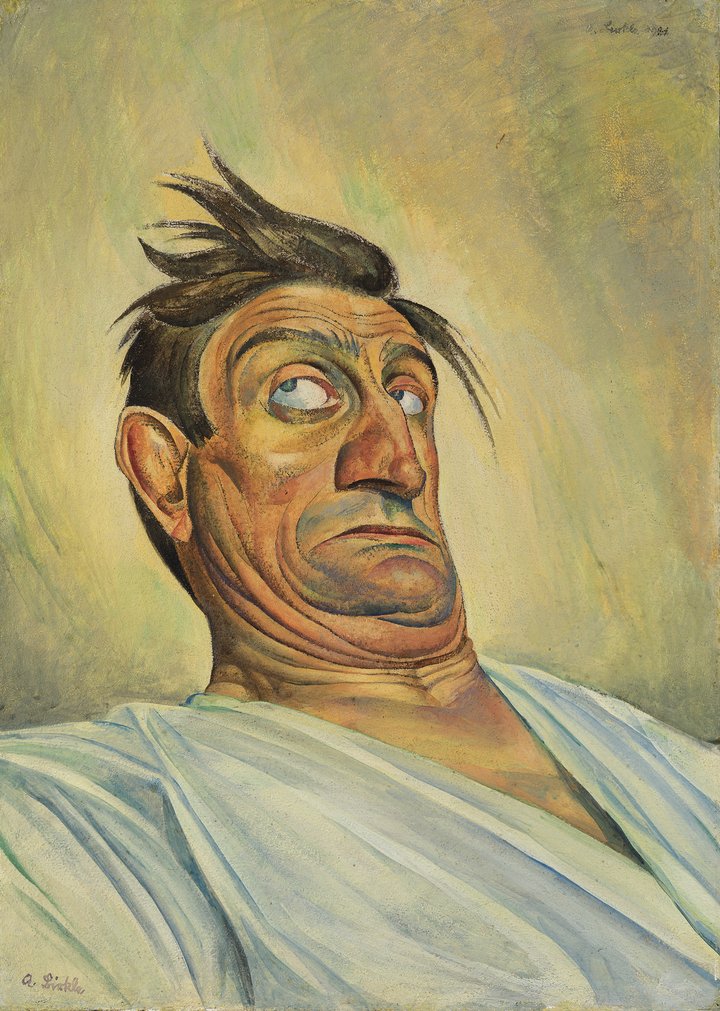This summer, Tate Modern will
explore the art of the Weimar Republic (1919-33) in a year-long, free
display, drawing upon the rich holdings of The George Economou
Collection. This presentation of around seventy paintings and works on
paper will address the complex paradoxes of the Weimar era, in which
liberalisation and anti-militarism flourished in tandem with political
and economic uncertainty. These loans offer a rare opportunity to view a
range of artworks not ordinarily on public display – some of which have
never been seen in the United Kingdom before – and to see a selection
of key Tate works returned to the context in which they were originally
created and exhibited nearly one hundred years ago.
Although
the term ‘magic realism’ is today commonly associated with the
literature of Latin America, it was inherited from the artist and critic
Franz Roh who invented it in 1925 to describe a shift from the anxious
and emotional art of the expressionist era, towards the cold veracity
and unsettling imagery of this inter-war period. In the context of
growing political extremism, this new realism reflected a more liberal
society as well as inner worlds of emotion and magic.
The
profound social and political disarray after the First World War and
the collapse of the Empire largely brought about this stylistic shift.
Berlin in particular attracted a reputation for moral depravity and
decadence in the context of the economic collapse. The reconfiguration
of urban life was an important aspect of the Weimar moment. Alongside
exploring how artists responded to social spaces and the studio,
entertainment sites like the cabaret and the circus will be highlighted,
including a display of
![Image result for [[["xjs.sav.en_US.rm5_jeM4r-k.O",5]],[["id","type","created_timestamp","last_modified_timestamp","signed_redirect_url","dominant_color_rgb","tag_info","url","title","comment","snippet","image","thumbnail","num_ratings","avg_rating","page","job"]],[["dt_fav_images"]],10000]](https://s-media-cache-ak0.pinimg.com/originals/25/df/6c/25df6c8513edd6a47f070f95483611cd.jpg)
![Image result for [[["xjs.sav.en_US.rm5_jeM4r-k.O",5]],[["id","type","created_timestamp","last_modified_timestamp","signed_redirect_url","dominant_color_rgb","tag_info","url","title","comment","snippet","image","thumbnail","num_ratings","avg_rating","page","job"]],[["dt_fav_images"]],10000]](https://www.moma.org/s/ge/collection_images/enlarge/59/66959.jpg)
![Image result for [[["xjs.sav.en_US.rm5_jeM4r-k.O",5]],[["id","type","created_timestamp","last_modified_timestamp","signed_redirect_url","dominant_color_rgb","tag_info","url","title","comment","snippet","image","thumbnail","num_ratings","avg_rating","page","job"]],[["dt_fav_images"]],10000]](https://i.pinimg.com/originals/ac/23/88/ac2388ffc43f5a3d6a8e394422d8a2d6.jpg)
Otto Dix’s enigmatic Zirkus (‘Circus’) print portfolio.
Artists recognised the power in representing these realms of public fantasy and places where outsiders were welcomed.

![Image result for [[["xjs.sav.en_US.rm5_jeM4r-k.O",5]],[["id","type","created_timestamp","last_modified_timestamp","signed_redirect_url","dominant_color_rgb","tag_info","url","title","comment","snippet","image","thumbnail","num_ratings","avg_rating","page","job"]],[["dt_fav_images"]],10000]](https://s-media-cache-ak0.pinimg.com/originals/25/df/6c/25df6c8513edd6a47f070f95483611cd.jpg)
![Image result for [[["xjs.sav.en_US.rm5_jeM4r-k.O",5]],[["id","type","created_timestamp","last_modified_timestamp","signed_redirect_url","dominant_color_rgb","tag_info","url","title","comment","snippet","image","thumbnail","num_ratings","avg_rating","page","job"]],[["dt_fav_images"]],10000]](https://www.moma.org/s/ge/collection_images/enlarge/59/66959.jpg)
![Image result for [[["xjs.sav.en_US.rm5_jeM4r-k.O",5]],[["id","type","created_timestamp","last_modified_timestamp","signed_redirect_url","dominant_color_rgb","tag_info","url","title","comment","snippet","image","thumbnail","num_ratings","avg_rating","page","job"]],[["dt_fav_images"]],10000]](https://i.pinimg.com/originals/ac/23/88/ac2388ffc43f5a3d6a8e394422d8a2d6.jpg)
Otto Dix’s enigmatic Zirkus (‘Circus’) print portfolio.
Artists recognised the power in representing these realms of public fantasy and places where outsiders were welcomed.

George Grosz, 'Suicide' 1916
Works
by Otto Dix, George Grosz and Max Beckmann perhaps best known today for
their unsettling depictions of Weimar life, will be presented alongside
the works of under recognised artists such as Albert Birkle, Jeanne
Mammen and Rudolf Schlichter, and many others whose careers were
curtailed by the end of the Weimar period due to the rise of Nationalist
Socialism and its agenda to promote art that celebrated its political
ideologies.
The
display comes at a pertinent time, in a year of commemoration of the
anniversary of the end of the First World War, alongside Aftermath: Art in the Wake of World War One at Tate Britain and William Kentridge’s new performance for 14-18 Now at Tate Modern entitled The Head and the Load, running from 11-15 July 2018.
Magic Realism is
curated by Matthew Gale, Head of Displays and Katy Wan, Assistant
Curator, Tate Modern. The display is realised with thanks to loans from
The George Economou Collection, with additional support from the Huo
Family Foundation (UK) Limited.The display will be accompanied by a fully illustrated catalogue from Tate Publishing:
Magic Realism: Art in Weimar Germany 1919-33
Matthew Gale and Katy Wan
231 x 231 mm, 112pp
ISBN 978-1-84976-588-6, £14.99
